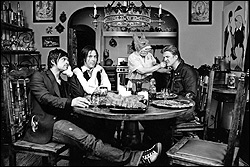American pop fans underestimate Shakira, and it’s her own damn fault. Bleaching your hair sure does grab people’s attention, as the megasales of Laundry Service attest. It can also convince ’em you’re dumb. The 2002 English-language debut from the wildest Colombian fabulist this side of Gabriel García Marquez (a fan and friend) was an improbable three-way collision among commerce, ambition, and eccentricity, the likes of which corpo-pop consolidation had all but homogenized off the planet. Yet many a shortsighted rocker mistranslated her hip wriggle as Britney en español, and no oddness round the edges would startle English-onlys who’d gathered from Telemundo that the inhabitants of our hemisphere’s more humid latitudes are uniformly passionate, gorgeous, and ridiculous. Not sure what she expected to accomplish by amping up the Cher quotient and dampening down the disco on her yanqui follow-up, but Oral Fixation, Vol. 2 (Epic) is a visionary muddle of the quirky and conventional, both wonderful and disappointing.
Then again, I expect too much of Shakira—and she can’t blame her stylist for that. In 2002, the old disco credo that untrammeled female passion is, in and of itself, monstrously empowering seemed more half-fib than half-truth, its two colossal ’80s variants no longer workable: Madonna-style postfeminism had deteriorated into Girls Gone Wild, while Whitney-brand gigantism had metastasized into Celine Gone Vegas. Shakira barreled past these revoltin’ developments by funneling desire’s universal nature through the language of exaggerated idiosyncrasy. For her, love was not doomed—she made the most of requited lust, not just on the faboo hit “Underneath Your Clothes,” but on the even better (maybe) “The One,” in which she pledged “To buy more thongs/And write more happy songs.”
Earlier this year, Shakira kept up the doing-no-wrong-ness with Fijacion Oral, Vol. 1— her first Spanish-language disc since 1998 and ostensibly a sop to the Latin audience she’d jilted to go angling for Anglos—when “La Tortura” unexpectedly crossed over to a U.S. audience historically averse to non-English lyrics. But the weirdness that’s subtly expressive on that album feels affected on its English partner, as culture-hopping enthusiasm gives way to dissociative jet lag. The lead track on Vol. 2, “How Do You Do,” begins with a choral high Mass chant, breaks for a serpentine wah-wah solo, then concludes with Arabic and Hebrew cries of atonement, while “Animal City” mixes up mariachi horns with funkified electro-rai. Are we there yet?
At the core of Vol. 2, however, is the candied and megacompressed post-Matrix guitar of contempo mall balladry. Shakira doesn’t mainstream her eccentric tics here so much as decorate the sonically expected with colorfully inappropriate details: a slide solo that sounds like Jeff Lynne–ified George Harrison on “Your Embrace,” an otherworldly synthesizer that whooshes from out of nowhere (or maybe the Missing Persons catalog) into the middle of “The Day and the Time.” Transcendent schlock like “Don’t Bother” rises above the tinny processing of its chorus, thanks to the kind of monumentally strangulated melisma that neither Sinéad nor Alanis nor what’s-her-name from the Cranberries has used to better effect. But when Carlos Santana butts in on “Illegal,” I wonder why they couldn’t have saved this for his next Grammy winner, or better yet, just sold it to Michelle Branch. And it’s not clear who she’s trying to impress by writing for Dawson’s Creek in a world that’s gone all OC.
I’d prefer to call the emotional states her lyrics target “distrust” and “forgiveness,” but given her increased seriousness, “sin” and “contrition” are more her game. The lead track, “How Do You Do,” rails against hypocrisy in at least four different languages, and relationships hobble toward the finish line so persistently I can’t tell you how relieved I was by the gushy dedication to her fiancé in the CD booklet. And she can whip up a decent metaphor in this morose mode, recalling a time when new love was “fresh as limes,” or promising that she’d cut her nails, watch football, or even “move to a communist country” for the chump she adores on “Don’t Bother.” Yet optimism remains better fuel for her verbal ingenuity, as on the coyly swinging “Hey You,” where her voice scrunches with kittenish glee around the lyric, “I’d like to be the owner of the zipper on your jeans.”
But her sole excursion into geopolitics is wackiest of all: The grand finale, “Timor,” is a new-wave disco number about genocide, complete with children’s chorus and a hiccupped repetition that uncannily echoes “She Bop.” Maybe Shakira longs to someday expand her global reach far enough to become Bob Marley fronting the B-52s, burning where the former preferred to simmer, looting the pop junk bin with an intercontinental range the latter couldn’t imagine. Even I don’t expect that much—as long as she’s torn between meeting expectations and surpassing them, Shakira may never quite accomplish either goal. Still, pop sheroes ain’t easy to come by these days, and what femme icon lights your fire anyway? Missy Elliot? Maureen Dowd? Hillary Clinton? Go ahead, say Madonna and I swear I will slap you soooo hard.








